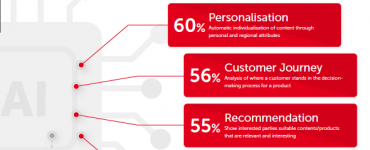-
Growing amounts of data confront many German companies with an impossible task, forcing them to squander their business potential
-
The targeted customer approach is an underestimated competitive factor, especially for small and medium-sized enterprises
-
Data should be used exclusively in the interests of the customer
Knowledge is power. When you know a lot about your customers, you can address them in a more targeted way. For example, shopping portals offer suitable product recommendations to customers, based on their purchasing behavior. Today, when surfing the Internet, interested customers are targeted on all websites. This type of predictive targeting reduces advertising wastage and is already well established in e-commerce. “In particular, large US providers have gained a competitive advantage by collecting and intelligently analyzing huge amounts of data from their customers,” says Dr. Torsten Schwarz, Head of Online Marketing at eco – Association of the Internet industry.
This type of commerce is also on the rise in Germany. However, there is a particularly large gap compared to US providers in other industries and small to medium-sized enterprises (SMEs): a company could offer significant added value for its customers through predictive marketing by presenting the right offers at the right time. With a knowledge database in the background, customers can be better advised, which also reduces the number of complaints. Newsletters reach the recipient when the actual content has a certain relevance for the customer.
Data minimization and predictive targeting belong together
However, SMEs in particular still face the challenge of using the collected data intelligently. Until now, many companies have collected customer data by means of separate systems (e.g. content management system and customer-relationship-management). “Merging, analyzing, and comparing these data silos with other data is very time-consuming,” says Schwarz. “As a result, many companies are drowning in their data and nonetheless make false offers to their customers.”
A key factor for the targeted approach to customers is their informed consent: it is important to inform the customers which data is collected and for what purpose. After all, predictive targeting means digitizing the customer relationship for their well-being. “Successful predictive targeting needs to meet data protection requirements. Only relevant data should be collected in a targeted manner. An informed consent of the customer is also critical,” says Schwarz. A useful example is a marketing solution in the cloud, where all data is merged together.




